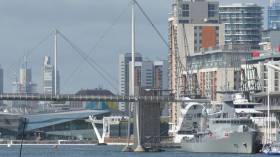Displaying items by tag: London Arms Fair
Irish Naval Service Along with Belgium Navy Attend London Arms Fair
#navy - The Irish Naval Service are not the only foreign navy so far attending the London Arms Fair as the Belgium Navy are represented with a vessel visiting the international event, writes Jehan Ashmore.
Furthermore to a previous report on Afloat at the weekend, RTE also writes today on the Defence Forces chiefs in defending the decision to send L.E. Samuel Beckett to the Defence and Security Equipment International (DSEI) fair following critism from among anti-war activists. DSEI is the world's biggest arms fair where some 1,600 exhibitors are in place from 54 countries.
L.E. Samuel Beckett costing around €70 million was built in 2014 by a British shipyard as the first Offshore Patrol Vessel (OPV90) class also referred as the 'Playwright' series. The same yard, Babcock Marine & Technology located in north Devon is constructing a fourth sister to be delivered in 2019 and commissioned into service as L.E. George Bernard Shaw.
As for the DSEI 2017 fair which is been held in the ExCEL Centre in London's east docklands, L.E. Samuel Beckett arrived via the nearby King George V Dock. The OPV was joined by the Belgium Navy in the form of the BNS Pollux. Last year Afloat reported on a NATO flotilla among which BNS Pollux called to Dublin Port. The vessel displacing 569 tonnes is also known as a Ready Duty Ship (RDS).
Sistership, BNS Castor also made a visit to the capital earlier this year following a ceremony to mark the 30th anniversary of the Zeebrugge ferry disaster.
In addition the naval presence at DSEI are those from the Royal Navy. They are HMS Argyll, Cattistock, Mersey,Trumpeter and Puncher.





























































